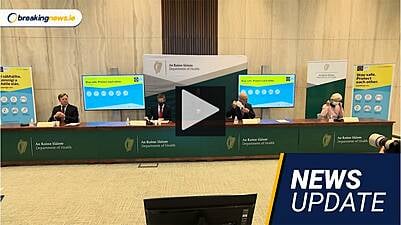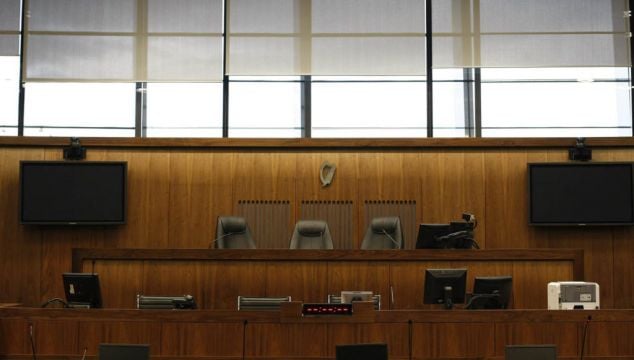Gardaí asked murder accused Stephen Penrose if he had his friend “dig his own grave” in the Kildare woodlands where his body was eventually discovered, a jury has heard.
The Central Criminal Court jury has heard that Mr Penrose gave different versions throughout his 19 interviews to detectives about where he had last seen Philip Finnegan. In his final interview, the accused told gardaí that he and Mr Finnegan got attacked by a group of men at “a forest”, having arranged to collect firearms from them.
Mr Penrose initially said the attack took place on the outskirts of Kilcock, Co Kildare, then on the road leading up to a house in Clonuff, Co Kildare. Subsequently, “it moved down towards a crossroads which intersected with a road towards Clonuff and Broadford” and then the accused suggested in his written statement that it was “somewhere near Edenderry” in Co Offaly.
Mr Penrose was first arrested on August 31st, 2016 for withholding information in relation to a serious assault on Mr Finnegan and interviewed on ten occasions at Kilmainham Garda Station. He was released from his detention after the tenth interview took place on September 2nd, when Mr Finnegan was still considered a missing person.
The accused was rearrested at Leixlip Garda Station on November 16th, 2016, after his friend’s body was discovered buried in the grave at Rahin Woods, and interviewed nine times. The defendant read a prepared handwritten statement to gardaí, which said: “I had nothing to do with Philip’s killing. All this had nothing whatsoever to do with me and that’s why I tried to distance myself from it”.
Mr Penrose (38), of Newtown Court, Malahide Road, Coolock, Dublin 17, has pleaded not guilty to murdering Mr Finnegan (24) at Rahin Woods, Rahin, Edenderry, Co Kildare on August 10th, 2016.
The trial has heard that Mr Finnegan was missing for just over three weeks before a dog walker and his two pets found his remains buried in a shallow grave in the Kildare woods on September 2nd, 2016.
Decapitated remains
Assistant state pathologist Dr Margaret Bolster has testified that the remains of Mr Finnegan were found in the grave on September 2nd and attempts had been made to burn his body. In the expert witness’s view, Mr Finnegan’s death was caused by multiple stab wounds to the body, including two fatal ones to his liver and aorta.
A forensic scientist told the jury that a DNA profile generated from a bloodied glove discovered near the decapitated and “skeletonised” remains of Mr Finnegan matched the DNA of Mr Penrose.
Evidence has been given by a paramedic that Mr Penrose had a stab wound to the inside of his left arm, when he examined him at Kilcock on August 10th at 6.45pm. The accused told gardaí in his interviews that he and Mr Finnegan met a number of men in a black car earlier that day. Mr Penrose said a man stabbed him in the arm and he also witnessed Mr Finnegan being stabbed in the back during an attack by the group of men. The accused said he then drove off at speed.
Giving evidence on Wednesday, Insp Aidan Hannon agreed with Brendan Grehan SC, prosecuting, that gardaí put it to the accused in his ninth and final interview on November 17th that he had given “another different account” for the attack by the group of men in his previous interview. “Because I’m afraid for my life. We went there to collect firearms, we’re talking about testing firearms,” said Mr Penrose.
Gardaí put it to the accused that he firstly said the attack happened in Kilcock, then he moved it when they showed him that this could not be possible and “now today it is at a caravan in a house beside a woods”. “How many times have you moved the location of where it happened?” asked the detectives. “I don’t know,” said Mr Penrose, adding that he was not “making up a new story”.
‘Fully prepared’
Detectives asked the accused what difference did it make telling gardaí that they were attacked in Kilcock and not Rahin Woods.
“You would not have found Philip’s body other than I gave you the phones,” he said.
However, officers told the accused that two walkers had found Mr Finnegan’s body.
“You came fully prepared: you came with your fork, your spade, came with your gloves, you came with your petrol can, you came with your knife. Did you have him dig his own grave?” asked gardaí.
Evidence has been given that a garden fork, a shovel and the blade of a knife were found close to the remains. The garden glove with substantial fire damage, a black funnel or fuel can nozzle and the remains of a mobile phone were found nearby buried in a fire pit.

In reply, the accused told the gardaí: “I said from the start of the interview there was extensive CCTV footage took by the garda around there, since the start of the investigation, you had my phones. You knew everywhere I was. Yous obviously, where did I pick up a fork and a shovel and a knife, yous are watching me going through McDonalds. Yous had my phone, yous knew exactly where I was from any time. You know. You know [sic]”.
The trial continues on Thursday before Mr Justice Alexander Owens and a jury of eight men and four women.
Evidence has also been given that Mr Penrose’s phone connected to a cell site close to the area where the victim’s body was found.
Mr Penrose dispensed with what was his second legal team “once again” last week and is continuing to decline to attend his trial, which is in its fifth week at the Central Criminal Court.







